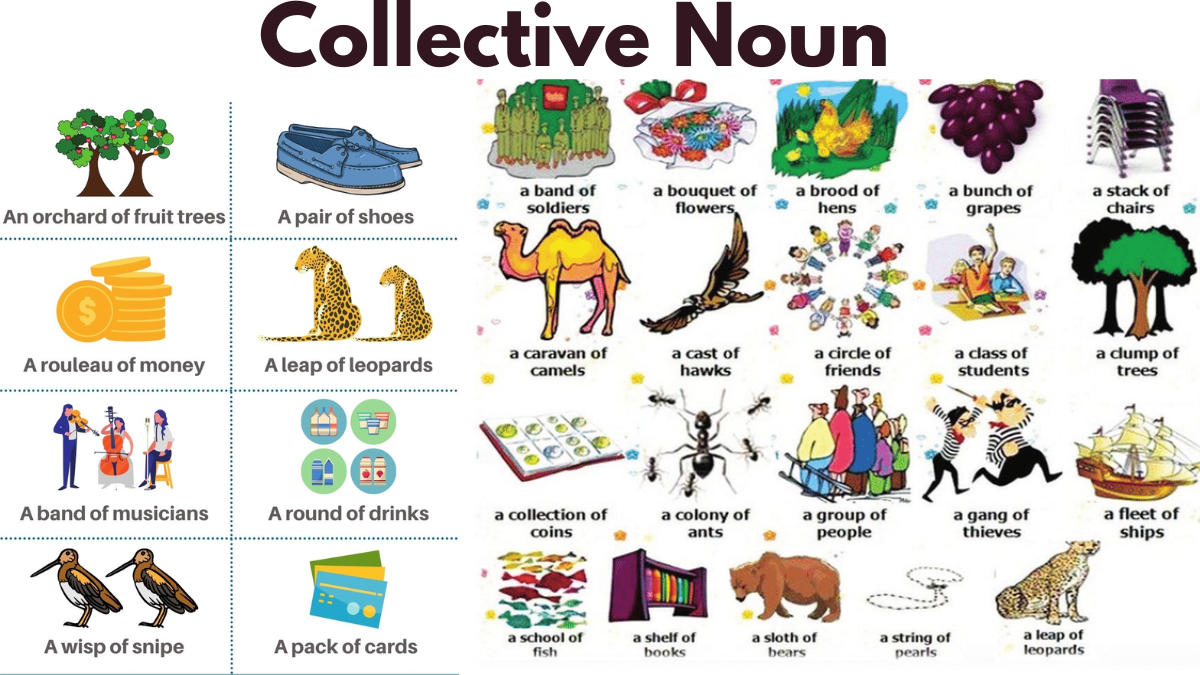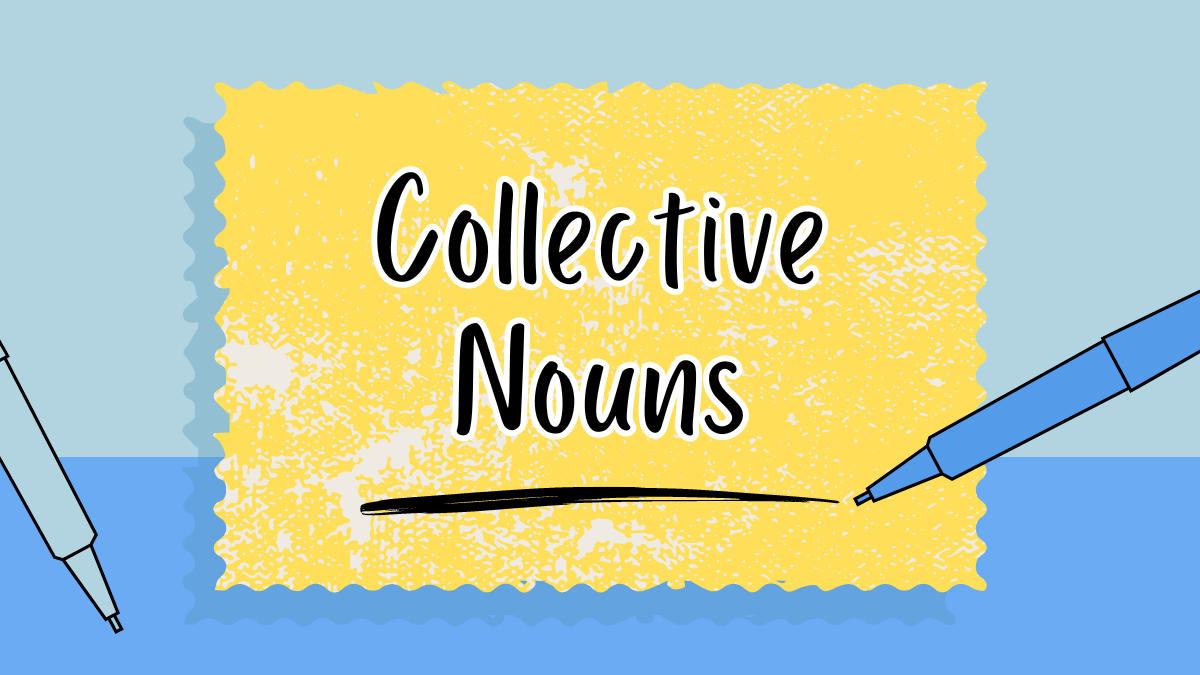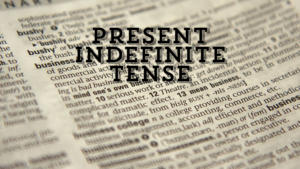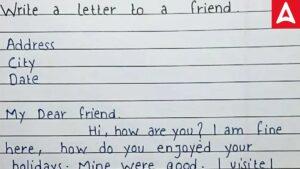Table of Contents
As the name suggests the nouns that are used to describe a collection of individuals or things are identified as Collective nouns. Out of the Five types of Nouns, these nouns are responsible for representing groups or collections of people, animals, or things as a single unit. Collective Noun Examples include “team,” “family,” “flock,” and “herd.” They simplify language by referring to a group as a whole entity, rather than listing individual members. Let’s understand What is Collective Nouns in English grammar with proper explanation and examples.
Collective Noun Definition
Collective Nouns is one type of Noun that is used to refer to a group or collection of persons or things as a whole. The word ‘ Collective ‘ means collection or groups of individuals. It is a type of naming word that describes a collection or group of people, things, ideas, etc. Collective nouns play a crucial role in enhancing sentence structure and conveying information concisely in English grammar. For example – a Class of students, a committee of managers, a fleet of ships, etc. These nouns represent a group rather than personal identity as in the case of Proper Nouns.
Collective Noun Examples
In English grammar, Collective Nouns refers to a group or collection of individuals. There are various collective noun present for different aspects. Students can memorize these nouns which helps to upgrade their vocabulary. Here we categorize these special nouns basically into 3 groups – Things, People, and animals. Here are some examples of collective nouns for these 3 groups.
Collective Nouns for Animals
To express a group or collection of different animals, we use some specific Collective Nouns for particular species. Here a list of some examples for animals below.
- Collective noun for ants – Army / Colony of Ants.
- Collective noun of wolves- pack
- Collective noun of lions- Prides
- Collective noun of fish – Shoal of fish
- Collection of Cattle – Heard of cattle
- Collection of birds – Flock of birds.
- Collective noun of Puppies – Litter of puppies.
- Collection of Monkey – Barrel of monkey
- Collective noun of Wolves- Pack of wolves
- Collection of Baboons –Troops of baboons.
- Collection of Rabbits – Wrack of rabbits.
- Collective noun of Bees – Swarm of Bees
Collective Nouns Examples of Things
There are some collective nouns used to describe a collection of non-living objects like a pack of cards, a bunch of Grapes, etc. In the following list, there are some examples of things-
- Collection of Keys, grapes – A bunch of grapes, keys, etc.
- Collection of sticks and hay – A bundle of sticks and hay.
- Collection of trees – A clump/grove of trees.
- Collection of sand – Heap of sands.
- Collection of stars – A cluster/constellation/ galaxy of stars.
- Collection of cars -A convoy of cars.
- Collection of lectures -A course or series of lectures.
- Collection of Islands – A group of Islands
- Collection of Pearls- A Cluster/Strings of pearls
- Collection of ships- A fleet of ships
- Collective noun of sailors- crew
Collective Nouns Examples for people
When we talk about a group or collection of people, certain collective nouns are used to describe it.
Some examples are –
- Collection of Musicians- A band of musicians.
- Collection of Directors- A board of directors, etc.
- Collection of girls, women – A bevy of girls, women, officers, etc.
- Collection of Merchants – A caravan of Merchants, pilgrims, and travelers.
- Collection of Mountains, hills – A chain/range of mountains or hills.
- Collection of Singers – A choir of singers.
- Collection of Students – A class of students.
- Collection of Servants – A retinue of servants/ attendants.
- Collection of soldiers – A company/regiment/army of soldiers.
- Collection of People – A crowd/mob of people.
Collective Nouns used in Sentences
Check how to use collective nouns while forming a sentence in the English language. Check their position which is given in bold.
1. The jury makes its final decision.
2. She lost her baby in the crowd.
3. The Council is responsible for the incident.
4. A committee has been formed to investigate this matter.
5. A flock of birds flew over the field.

Collective Nouns List
In English, certain collective nouns are very commonly used in our lives to define a collection of people or things. Check the full collective noun list here only for all school and competitive exams.
| Examples | |
|
|
Are Collective Nouns Singular or Plural?
As we know, a collective noun is a group of people or things, such as a herd, assembly, staff, or jury. There is a little confusion about using the right form of the verb with a collective noun. These are used in place of plural nouns as singular nouns. Let’s understand it easily with examples.
On Monday, a band of musicians will perform at our college.
In the above sentence, the band is represented as a single entity. So, a singular verb is used. In most cases,such nouns take singular verbs.
But in some cases, it acts like plurals. When members of a group act together, the singular verb is used, but when members of a group act individually, the pleural verb is used.
For example,
- The team is ready for the tournament.
- The players are trying new jerseys.
- The jury makes its final decision.
- She lost her baby in the crowd.
- The Council is responsible for the incident.
- A committee has been formed to investigate this matter.
- A flock of birds flew over the field
Collective Nouns Exercise
Direction- Fill in the Blanks with a suitable collective Noun
1. Collection Noun for trees ___________________ .
2. Collection Noun for Directors ___________________ .
3. Collection Noun for Ships ___________________ .
4. Collection Noun for Singers ___________________ .
5. Collection Noun for stars ___________________ .
6. Collection Noun for Pearls ___________________ .
7. Collection Noun for Wolves ___________________ .
8. Collection Noun for cattle ___________________ .
9. Collection Noun for Puppies___________________ .
10. Collection Noun for birds ___________________ .
| Read Other Types of Nous | |
| Proper Noun | Abstract Nouns |
| Possessive Nouns | Plural Nouns |


 Present Indefinite Tense: Formula, Exerc...
Present Indefinite Tense: Formula, Exerc...
 Email Writing Format for Class 10- Check...
Email Writing Format for Class 10- Check...
 Letter Writing in English, Types, Tips, ...
Letter Writing in English, Types, Tips, ...





























